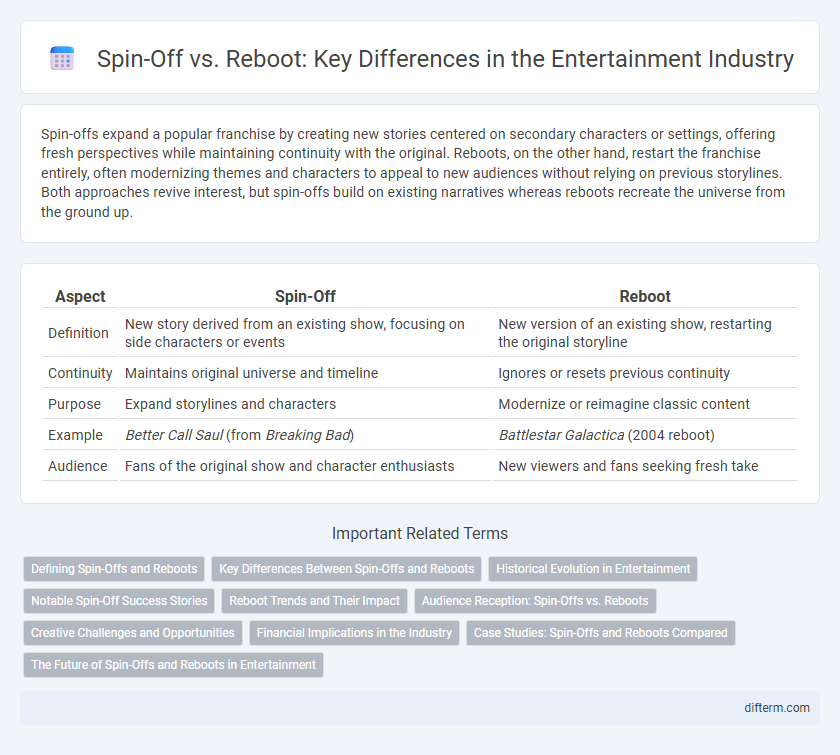Spin-offs expand a popular franchise by creating new stories centered on secondary characters or settings, offering fresh perspectives while maintaining continuity with the original. Reboots, on the other hand, restart the franchise entirely, often modernizing themes and characters to appeal to new audiences without relying on previous storylines. Both approaches revive interest, but spin-offs build on existing narratives whereas reboots recreate the universe from the ground up.
Table of Comparison
| Aspect | Spin-Off | Reboot |
|---|---|---|
| Definition | New story derived from an existing show, focusing on side characters or events | New version of an existing show, restarting the original storyline |
| Continuity | Maintains original universe and timeline | Ignores or resets previous continuity |
| Purpose | Expand storylines and characters | Modernize or reimagine classic content |
| Example | Better Call Saul (from Breaking Bad) | Battlestar Galactica (2004 reboot) |
| Audience | Fans of the original show and character enthusiasts | New viewers and fans seeking fresh take |
Defining Spin-Offs and Reboots
Spin-offs expand the original entertainment universe by focusing on secondary characters or plotlines, offering fresh narratives within familiar settings. Reboots recreate an existing property from the ground up, often altering key elements such as story arcs, characters, or tone to attract new audiences. Both strategies aim to revitalize franchises but differ fundamentally in their approach to continuity and originality.
Key Differences Between Spin-Offs and Reboots
Spin-offs expand an existing universe by focusing on secondary characters or new storylines, maintaining continuity with the original work, while reboots restart a franchise by reimagining the original premise, often with new casts and updated settings. Spin-offs typically retain the original's timeline and character relationships, delivering deeper exploration within the same fictional world. Reboots aim to attract new audiences and refresh the narrative by altering foundational elements, sometimes disregarding previous continuity altogether.
Historical Evolution in Entertainment
Spin-offs in entertainment emerged as a creative strategy during the 1960s, allowing popular characters or storylines from existing shows or films to develop independently, thus expanding franchise universes. Reboots gained prominence in the late 1990s and early 2000s, driven by studios' intent to modernize and reimagine older properties for new audiences, often altering original narratives significantly. This historical evolution reflects shifting industry priorities from expanding narratives within established worlds to reinterpreting intellectual properties for contemporary cultural relevance.
Notable Spin-Off Success Stories
Notable spin-off success stories in entertainment include *Frasier*, which originated from *Cheers*, and *Better Call Saul*, derived from *Breaking Bad*, both achieving critical acclaim and expanding their original narratives. Spin-offs often capitalize on existing fan bases by exploring secondary characters or untold stories, offering fresh perspectives while maintaining continuity. In contrast to reboots that restart stories, successful spin-offs deepen the original universe, generating new plotlines and audience engagement.
Reboot Trends and Their Impact
Reboot trends in entertainment have surged, revitalizing classic franchises by modernizing storylines and characters to attract new audiences while retaining original fans. This approach often emphasizes contemporary social themes and advanced visual effects, driving renewed interest and robust box office performances. The impact of reboots reshapes industry strategies, influencing content creation to balance nostalgia with innovation for sustained franchise longevity.
Audience Reception: Spin-Offs vs. Reboots
Spin-offs generally receive more positive audience reception by expanding beloved universes and deepening character development, attracting existing fans and niche viewers. Reboots often face mixed reactions due to comparisons with the original content, with some fans embracing updated storytelling while others resist changes to iconic elements. Audience reception trends reveal that spin-offs benefit from established continuity and familiarity, whereas reboots must balance innovation with nostalgia to succeed.
Creative Challenges and Opportunities
Spin-offs present unique creative opportunities by expanding existing storylines and character development, allowing writers to explore untapped perspectives within a familiar universe. Reboots offer the challenge of reinventing characters and plots for new audiences, balancing nostalgia with innovative storytelling to revitalize a franchise. Both approaches demand strategic creativity to maintain fan engagement while delivering fresh, relevant content in a competitive entertainment landscape.
Financial Implications in the Industry
Spin-offs often require lower financial investment than reboots since they leverage existing storylines and characters, reducing development costs and marketing risks. Reboots can attract new audiences and generate significant revenue by refreshing a franchise but typically entail higher expenses due to reimagining established properties. Studios weigh these financial factors carefully to maximize return on investment in the competitive entertainment industry.
Case Studies: Spin-Offs and Reboots Compared
Spin-offs like "Frasier," derived from "Cheers," demonstrate the potential for new narratives that expand beloved universes while preserving original character appeal. Reboots such as the "Battlestar Galactica" series illustrate the strategy of reimagining core premises to attract fresh audiences and modernize storytelling. Comparing case studies reveals spin-offs often maintain fan loyalty through continuity, whereas reboots prioritize innovation and broader market reach.
The Future of Spin-Offs and Reboots in Entertainment
Spin-offs and reboots continue to shape the future of entertainment by expanding existing universes and reimagining beloved franchises for new audiences. Spin-offs leverage established characters and storylines to create fresh narratives, while reboots reset original plots to align with contemporary tastes and technological advancements. Streaming platforms and global demand for diverse content drive the evolution and increased production of both spin-offs and reboots.
spin-off vs reboot Infographic

 difterm.com
difterm.com